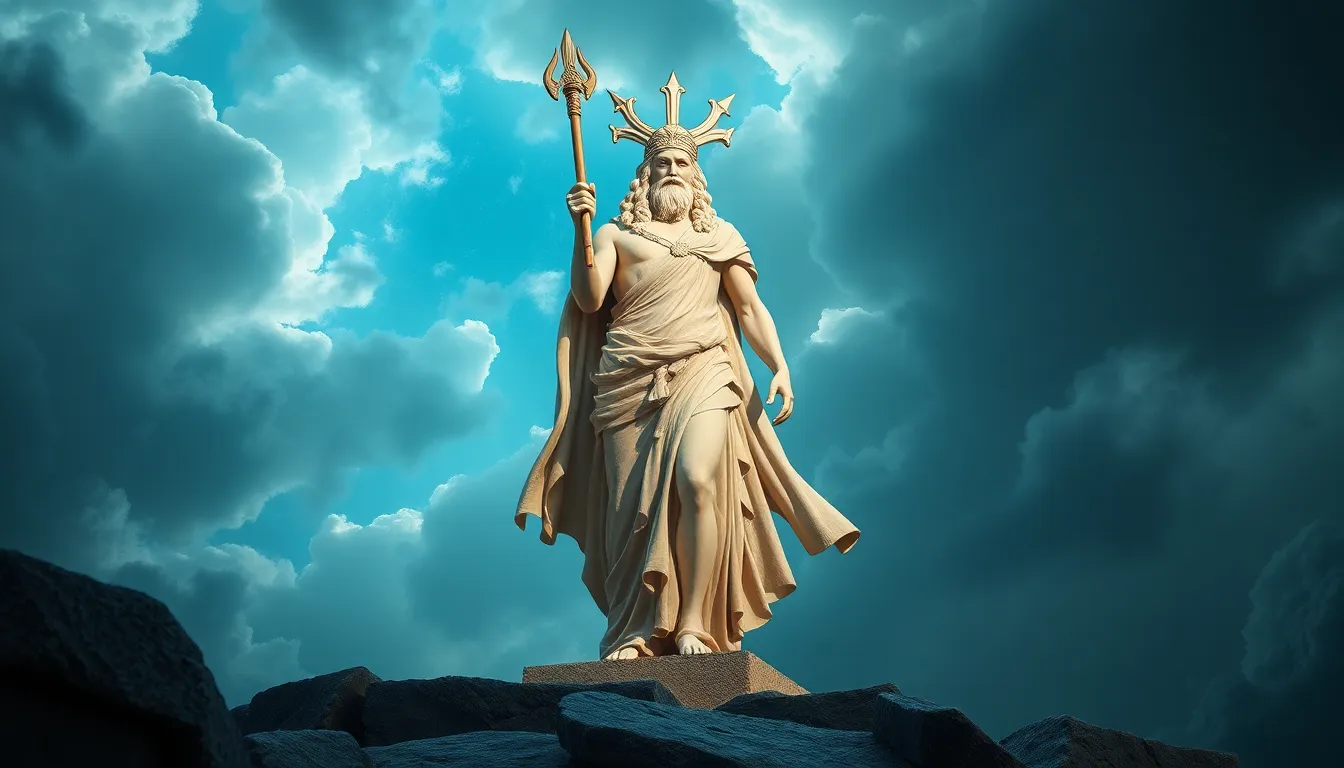Uranus: The Sky God Who Shaped the Fate of the Titans
I. Introduction
In Greek mythology, Uranus represents the primordial sky, a deity whose presence is integral to the creation and evolution of the cosmos. As the father of the Titans, Uranus’s influence extends far beyond his own existence, shaping the destinies of his children and subsequent generations. This article aims to delve into the multifaceted role of Uranus in mythological narratives, exploring his relationships, conflicts, and legacy within the context of the Titans and primordial deities.
II. The Birth of Uranus
Uranus emerged from the void, known as Chaos, in the earliest moments of Greek cosmology. He personifies the sky, a vast expanse that envelops the Earth and connects the heavens with the terrestrial realm.
Uranus’s relationship with Gaia, the Earth, is foundational to Greek mythology. Gaia, often depicted as the nurturing mother, gave birth to Uranus, and together, they formed the basis of the universe. Their union symbolizes the duality of existence, where the earth and sky coexist harmoniously, yet their relationship is fraught with tension that eventually leads to conflict.
Symbolically, Uranus represents not just the sky but also the overarching principles of creation and order. His very existence encapsulates the celestial and divine order that governs the world, influencing all that emerges from the primal void.
III. Uranus and the Titans
From the union of Uranus and Gaia came the Titans, a powerful generation of deities who would play pivotal roles in the myths of ancient Greece. The Titans include notable figures such as:
- Cronus: The leader of the Titans, known for his eventual rebellion against Uranus.
- Rhea: The mother of the Olympian gods and sister-wife to Cronus.
- Oceanus: The Titan god of the ocean, representing the great river encircling the Earth.
- Tethys: The goddess of the nourishing waters and wife of Oceanus.
- Hyperion: The Titan of light, often associated with the sun.
The characteristics of the Titans vary widely, from Cronus’s cunning nature to Oceanus’s vastness. They symbolize various aspects of the natural world and human experience, representing the powers that govern life and nature. The significance of the Titan generation lies in their complexity—they are not merely gods of strength but also embody philosophical concepts such as time, memory, and justice.
IV. The Rebellion Against Uranus
The narrative takes a dramatic turn with the prophecy that Uranus would be overthrown by one of his own children. Fearing this prophecy, Uranus imprisoned many of his offspring within Gaia, causing great pain and resentment.
Cronus, the youngest Titan, ultimately rises against his father. In a pivotal moment of myth, he ambushes Uranus with a sickle, castrating him and casting his severed genitals into the sea. This act not only signifies the end of Uranus’s reign but also serves as a powerful symbol of rebellion against tyranny.
Myths surrounding the castration of Uranus carry various interpretations. It is seen as a necessary act for the continuation of the cosmos, highlighting the theme of cyclical power shifts present in mythology. The act also reflects the tumultuous nature of familial relationships among the gods, where loyalty is often challenged by ambition.
V. The Aftermath of Uranus’s Fall
Uranus’s fall from power has significant repercussions. From his blood, which spills onto the earth, emerge new deities and creatures, including:
- Erinyes (Furies): Deities of vengeance.
- Giants: Enormous beings representing chaos and strength.
- Nymphs: Spirits of nature associated with various natural elements.
The implications of Uranus’s demise extend to the Titan generation, who must navigate a new world order dominated by the Olympian gods. The Titanomachy, a ten-year battle between the Titans and the Olympians led by Zeus, signifies the shift in power dynamics that follow Uranus’s fall.
VI. The Legacy of Uranus
Uranus’s influence permeates subsequent generations of gods, particularly in how they navigate their relationships and power struggles. His story is echoed in the themes of rebellion, power, and the cyclical nature of authority that resonate throughout Greek mythology.
In literature and art, Uranus is often depicted as an ethereal figure, embodying the vastness and mystery of the sky. His legacy prompts reflection on the origins of the universe and the forces that shape it.
The enduring impact of Uranus is evident in modern interpretations of mythology, where he is frequently referenced as a symbol of the primordial forces that govern existence, reflecting humanity’s ongoing quest to understand the cosmos.
VII. Comparative Analysis
In examining Uranus within the broader context of mythology, we find parallels with other sky gods across different cultures, such as:
- Ouranos: The Greek equivalent of Uranus, representing the sky in earlier myths.
- Nut: The Egyptian goddess of the sky, who swallows the sun each evening.
- Varuna: The Hindu god associated with the sky, water, and cosmic order.
The archetype of the sky deity is culturally significant, often embodying themes of creation, authority, and the balance of nature. Uranus’s story parallels those of other mythological figures, highlighting shared themes of conflict, the complexity of familial relationships, and the quest for power.
VIII. Conclusion
Uranus plays a crucial role in shaping the fate of the Titans and the narrative arcs of Greek mythology. His relationships, conflicts, and eventual fall serve as a microcosm of the larger themes present in mythological stories: the struggle for power, the complexities of family dynamics, and the cyclical nature of existence.
Understanding primordial figures like Uranus enriches our comprehension of mythology and its relevance to human experience. The legacy of Uranus continues to resonate today, reminding us that the stories of the past are not just tales of gods, but reflections of our own struggles and aspirations.




